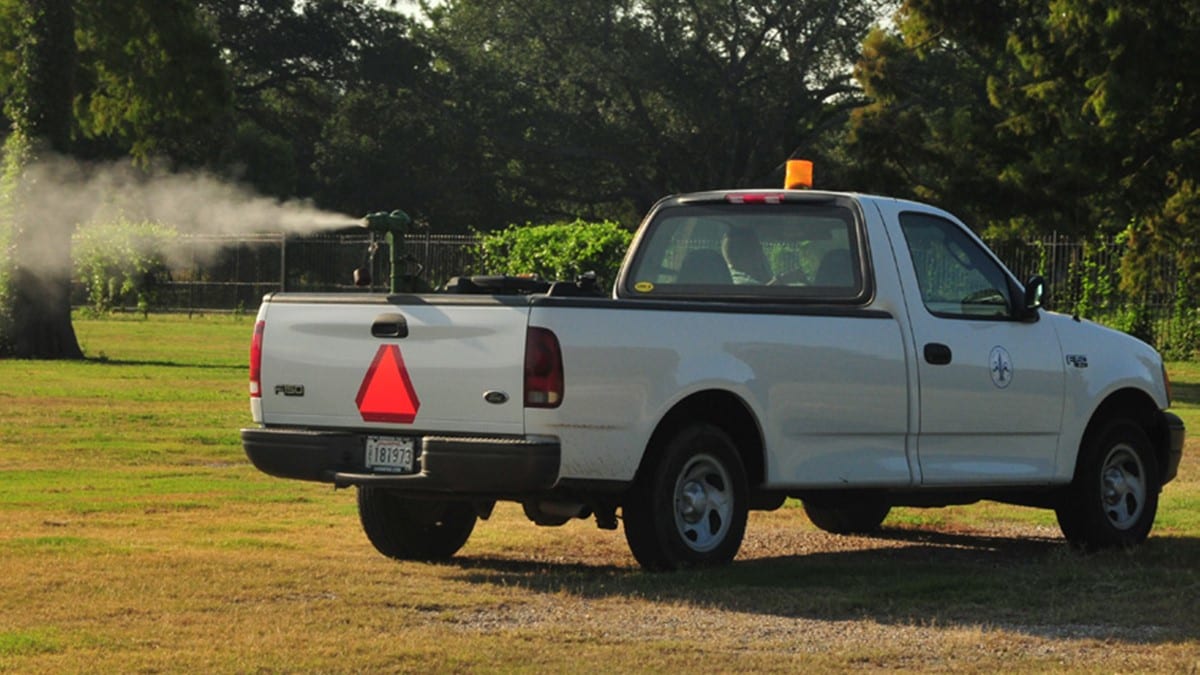What to know
- Truck spraying is used to control and reduce the number of mosquitoes that can spread viruses.
- Truck spraying can reduce your chances of getting sick from a mosquito-borne disease.
- Trucks can treat areas with larvicides or adulticides to kill mosquito larvae or adult mosquitoes.

What you need to know about truck spraying
Trucks fitted with special spray equipment can be used to treat areas with larvicides or adulticides to kill mosquito larvae or adult mosquitoes. This process is called truck spraying. Truck spraying is used to:
- Control and reduce the number of mosquitoes that can spread viruses. This can reduce your chances of getting sick.
- Control and reduce the number of nuisance mosquitoes that bother people but do not spread viruses.
- Treat entire neighborhoods in a short period of time compared to some other methods.
Mosquito control districts or local government departments track both nuisance mosquitoes and mosquitoes that can spread viruses. Spraying larvicides and adulticides from a truck is one way to kill mosquito larvae or adult mosquitoes in an area. This is especially important when people in a community are getting sick from mosquito bites.
Truck spraying is safe
- When applied according to label instructions, Environmental Protection Agency (EPA)-registered insecticides do not pose a risk to human health or the environment.
- If people prefer to stay inside when spraying takes place they can, but it is not necessary.
- When truck spraying is done correctly, it does not cause asthma attacks.
- Truck spraying poses minimal risk to pets, animals, and the environment.
There is a possibility that spraying larvicides, like Bti, or adulticides can cause eye irritation if a person is outside when spraying takes place.
What mosquito control trucks spray
Adulticides
Mosquito control trucks spray very small amounts of adulticides into the air to kill flying adult mosquitoes. This spray is a fine mist that acts as a fogger in the area.
Larvicides
Mosquito control trucks apply larvicides directly to the water where mosquito larvae have been detected. This type of application is also useful to kill mosquito larvae living in places that are difficult to reach.

When truck spraying occurs
Adulticiding
Adulticide spraying occurs when mosquitoes are most active and when pollinating insects are not active.
Larviciding
Larvicide spraying typically occurs during the day. This allows the driver to easily locate bodies of water where mosquito larvae have been detected.
How to find out when truck spraying will occur
Generally, local government agencies or mosquito control districts announce the dates and times of spraying. They may publish information in the local newspaper, on district websites and social media, through public service announcements, by telephone, or with door-to-door campaigns.
How communities decide to spray
Mosquito surveillance helps professionals and local governments determine when, where, and how often to spray.
After spraying, local government departments or mosquito control districts will track mosquito populations. Professionals may decide to treat an area again to reduce the chances that people will get bitten by mosquitoes.
What to do when truck spraying occurs
Spraying is safe when applied by a licensed vector control professional who follows label instructions. If you prefer to stay inside and close windows and doors, you can, but it is not necessary.
The spray does not harm pets, but you may choose to bring them inside when spraying occurs. Contact your doctor or healthcare provider if you have any concerns following spraying.
Information on insecticides and health
- The Environmental Protection Agency oversees the registration of insecticides.
- The National Pesticide Information Center (NPIC) provides information online or through a toll-free number, 1-800-858-7378.
References
- Centers for Disease Control and Prevention. Human exposure to mosquito-control pesticides--Mississippi, North Carolina, and Virginia, 2002 and 2003. Morb Mortal Wkly Rep. 2005 June;54(21):529-32.
- Lothrop HD, Lothrop BB, Gomsi DE, Reisen WK. Intensive early season adulticide applications decrease arbovirus transmission through the Coachella Valley, Riverside County, California. Vector Borne Zoonotic Dis. 2008 Aug;8(4):475-89.
- Pokhrel V, DeLisi NA, Danka RG, Walker TW, Ottea JA, Healy KB. Effects of truck-mounted, ultra low volume mosquito adulticides on honey bees (Apis mellifera) in a suburban field setting. PLoS ONE. 2018;13(3):e0193535. doi: 10.1371/journal.pone.0193535.
- Schleier JJ III, Marshall LA, Davis RS, Peterson RKD. A quantitative approach for integrating multiple lines of evidence for the evaluation of environmental health risks. PeerJ. 2015;3:e730.
- Tai Z, Connelly CR, Lange SK, Foley N, De Leon Rivera J, Lozano S, Nett RJ. A scoping review to determine if adverse human health effects are associated with use of organophosphates for mosquito control. J Med Entomol. 2024 Oct 19;62(1):8-18.
